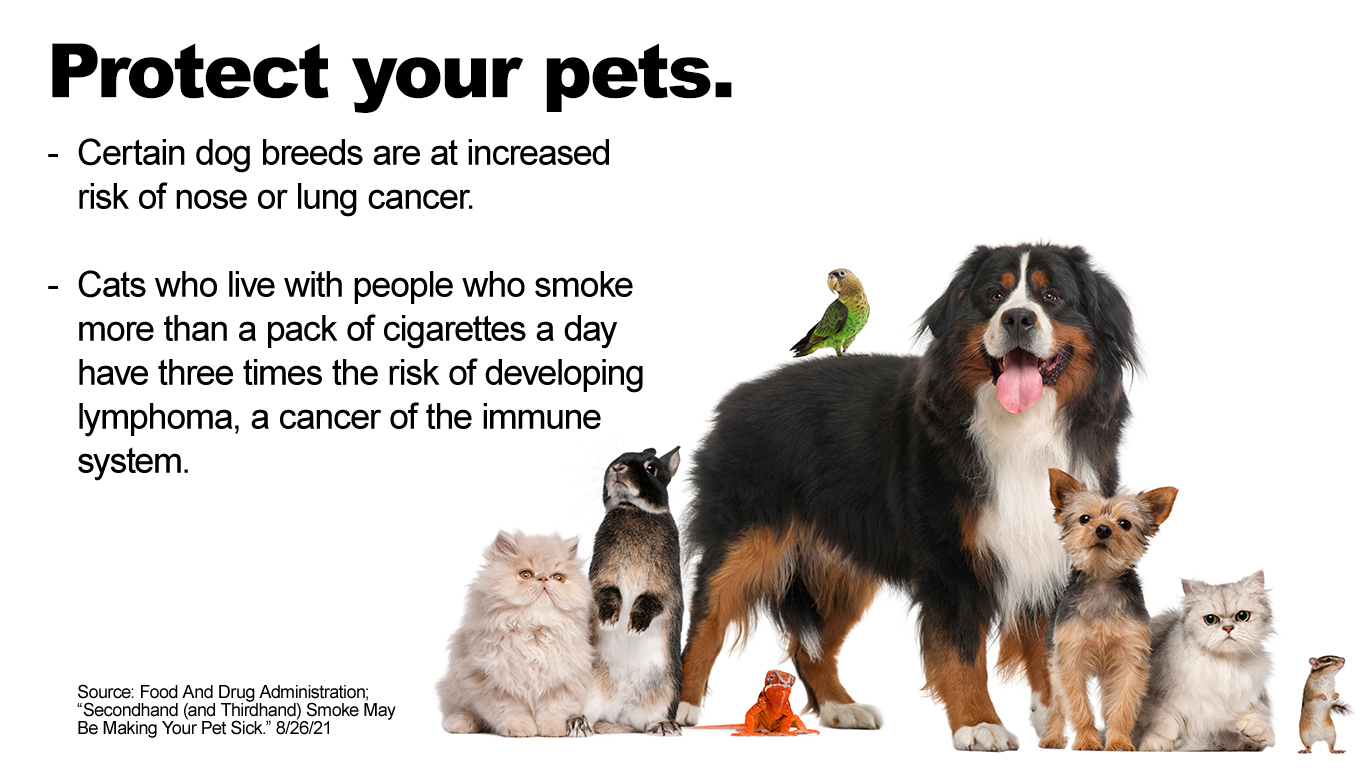Secondhand Smoke and Pets

Secondhand smoke and vape aerosols lingers in the air your animal breathes in and is harmful to pets.
Thirdhand smoke is a residue of harmful compounds that are left behind, such as nicotine, that can get on skin and clothes, furniture, carpets, and other things where a smoker lives.
Like children, dogs and cats spend a lot of time on or near the floor, where tobacco smoke residue concentrates in house dust, carpets, and rugs. It gets on their fur.
Dogs, cats, and children not only breathe these harmful substances in, but pets can also ingest them by licking their owner’s hair, skin, and clothes.
Facts That May Surprise You About Pets and Smoking
- Tobacco smoke affects a dog, depending on the length of the dog’s nose. Long-nosed dogs – Dogs with long noses, like collies, greyhounds, and dachshunds, have a higher risk of nasal cancer. This is because the toxins in cigarette smoke build up in their nasal passages. Short-nosed dogs – Dogs with shorter noses, like pugs, have a higher risk of lung cancer. This is because the smoke goes directly into their lungs instead of being filtered in the nose.
- For dogs that already have breathing or lung issues, inhaling tobacco smoke can worsen their symptoms and chronic coughing. Dogs can develop changes in their airways and lungs that are like those found in people who smoke. Ultra-fine smoke particles can activate the immune system of people. A type of white blood cell in the lungs involved in this immune response is called an alveolar macrophage.
- Certain dog breeds are at increased risk of nose or lung cancer.
- Cats who live with people who smoke more than a pack of cigarettes a day have three times the risk of developing lymphoma, a cancer of the immune system. Cats are careful groomers, which keeps them looking beautiful. But grooming can be a bad thing for cats living in a smoking household. Cats breathe in secondhand smoke directly, just like dogs. When cats groom themselves, though, they also ingest thirdhand smoke particles that fall onto their fur.
- Your smoking can endanger your pet bird. Birds are very sensitive to air pollution, especially tobacco smoke. They can develop changes to their respiratory system similar to those seen in children exposed to tobacco smoke.
Birds that live in a smoking household breathe in secondhand smoke. And, like cats, birds like to groom or “preen” themselves. When they do so, they ingest thirdhand smoke particles that have coated their feathers. Birds are also exposed to thirdhand smoke by perching on their owners’ clothes or hands and absorbing the harmful particles through their feet or by preening their owners’ hair and ingesting the particles.
- Smoking is dangerous for your pet guinea pig. Pocket pets” aren’t immune to the effects of tobacco smoke. In one study, guinea pigs exposed to secondhand smoke for more than 6 months developed microscopic changes in their lungs similar to those seen in people who smoke. They also developed other problems like emphysema, a disease where the tiny air sacs in the lungs, the alveoli, get “stretched out” and don’t work properly; and pulmonary hypertension, high blood pressure in the blood vessels from the heart to the lungs, due to the vessels being too thick or not stretchy enough.
- Secondhand smoke and toxic vape aerosols also hurt your pet fish. Both secondhand smoke and thirdhand smoke contain a lot of nicotine. Because nicotine dissolves easily in water, it can eventually end up in a fish tank’s water and poison the fish inside it. Fish exposed to toxic levels of nicotine can develop muscle spasms, rigid fins, and loss of color. They may also die.
Source: Food and Drug Administration, content current as of 10/26/22; “Be Smoke-Free and Help Your Pets Live Longer, Healthier Lives.
